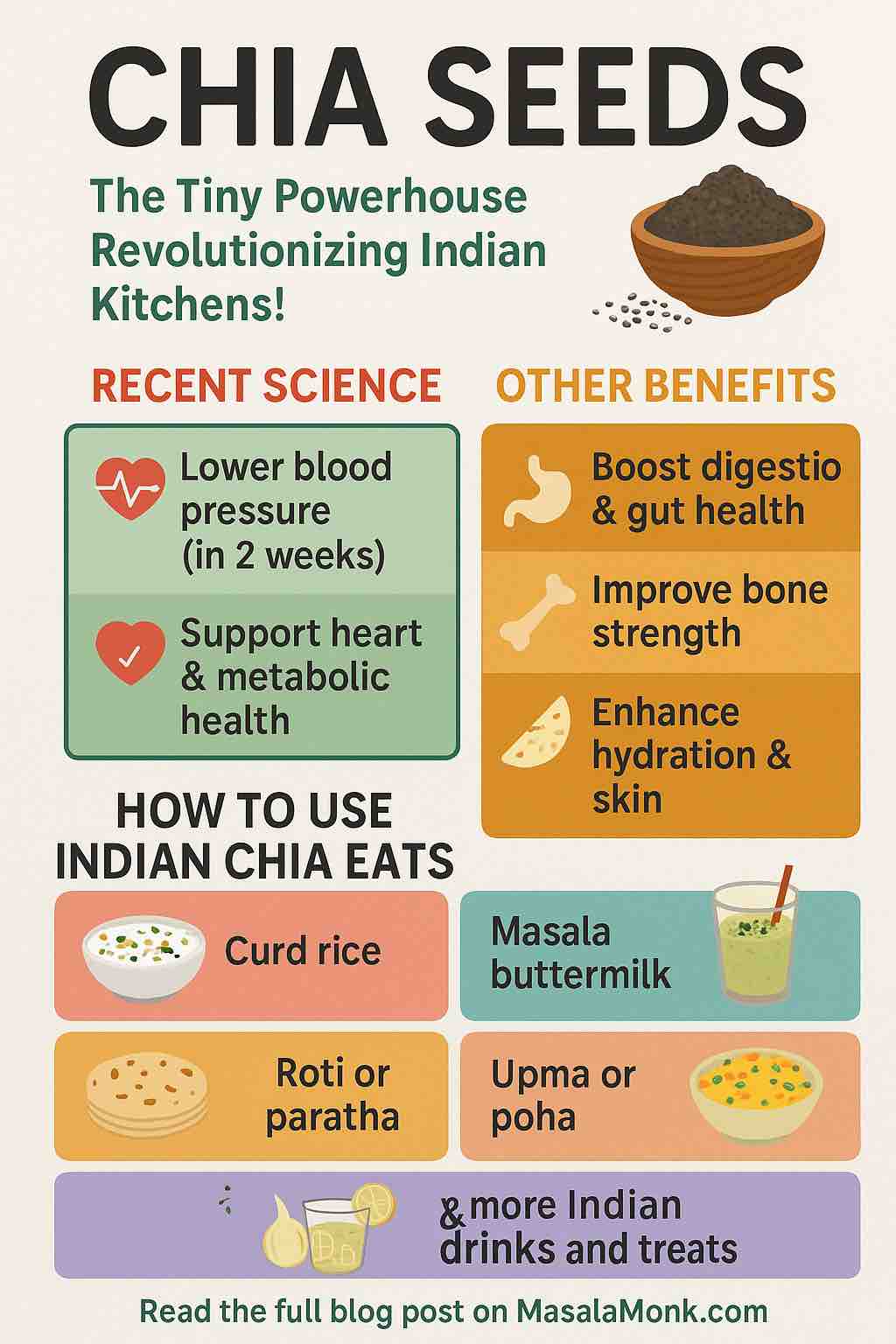
Chia seeds—once a humble staple of ancient Aztec and Mayan cultures—have rapidly gained superstar status in Indian kitchens. But is this “superfood” just a passing trend, or does modern research truly back its benefits? And most importantly, how can you actually use chia seeds in your daily Indian meals, in ways that are both easy and tasty?
Let’s explore the latest research, break down their real-life advantages, and share 5 fresh, practical Indian ways to enjoy chia seeds every day.
What Makes Chia Seeds Special? (And Why Should Indians Care?)
Chia seeds (Salvia hispanica L.) are tiny black or white seeds loaded with:
- Omega-3 fatty acids (alpha-linolenic acid)
- Protein (all essential amino acids)
- Dietary fiber (both soluble and insoluble)
- Minerals (calcium, magnesium, phosphorus, iron)
- Antioxidants (quercetin, chlorogenic acid, kaempferol)
But what does the latest science say about their real health benefits, especially for Indian lifestyles?
Latest Science: What 2025 Research Shows
1. Lowers Blood Pressure (even in 2 weeks)
A meta-analysis of clinical trials published in early 2025 confirmed chia seeds help reduce systolic and diastolic blood pressure—especially in people with mild hypertension. The effect is attributed to their high fiber and plant omega-3 content. (Source: PubMed, 2025)
2. Supports Heart & Metabolic Health
Consuming chia seeds regularly has been shown to reduce triglycerides and LDL (bad) cholesterol, and may even help with modest weight loss. Indian nutritionists are especially interested, given rising rates of heart disease and diabetes in India.
3. Boosts Digestive and Gut Health
Their soluble fiber forms a gel in your gut, which feeds “good” gut bacteria, keeps you regular, and helps prevent blood sugar spikes after Indian carb-rich meals.
4. Improves Bone Strength
A single tablespoon of chia seeds provides about 18% of your daily calcium needs—making them a plant-based boon for vegetarians, vegans, and anyone avoiding dairy.
5. Enhances Hydration and Skin Health
Soaked chia seeds trap water, helping you stay hydrated. Doctors in India now recommend them to patients dealing with hot, dry climates and digestive issues. Early evidence also points to better skin hydration and even mood improvements!
How Much Chia Should You Eat?
- Safe amount: 1–2 tablespoons (15–30 grams) a day is enough.
- How to use: Always soak chia seeds for at least 20 minutes before use—dry seeds can expand in your throat and may be a choking risk.
- Hydrate well: Since they absorb water, drink plenty of fluids.
5 Creative, Practical Ways to Add Chia Seeds to Indian Food
Here’s how you can effortlessly make chia seeds part of your Indian meals—with ideas for every taste and meal of the day!
1. Chia Curd Rice (Dahi-Chia Bowl)
Why: Adds protein, omega-3, and fiber to a classic comfort dish.
How:
- Mix 1 tablespoon soaked chia seeds into 1 bowl of curd rice (or raita).
- Add salt, roasted jeera powder, chopped cucumber, and a classic tadka (mustard, curry leaves, ginger, hing).
- Garnish with pomegranate or coriander.
Pro Tip: Great for lunchboxes—keeps you full, cool, and energized.
2. Masala Chia Buttermilk (Chia-Chaas)
Why: Stay hydrated and support gut health, especially in hot Indian summers.
How:
- Whisk 1 cup buttermilk/yogurt with roasted cumin, black salt, chopped mint, and green chili.
- Stir in 1 teaspoon soaked chia seeds.
- Serve chilled.
Pro Tip: For a tangy twist, add a pinch of chaat masala or grated ginger.
3. Chia Roti/Paratha
Why: Add fiber and healthy fats to everyday Indian breads—without changing the taste!
How:
- Add 1 tablespoon whole or ground chia seeds to 2 cups atta (wheat flour) while kneading dough.
- Proceed as usual to make soft rotis or parathas.
Pro Tip: Kids won’t even notice—perfect for picky eaters!
4. Savory Chia Upma or Poha
Why: Upgrade your breakfast or evening snack for better satiety and gut health.
How:
- Sprinkle 1 tablespoon soaked chia seeds into your upma or poha just before serving.
- Mix well and let stand 2–3 minutes so the chia gels into the mixture.
Pro Tip: Also works with dhokla or savory oats.
5. Chia-Infused Indian Drinks (Nimbu Pani, Jaljeera, Sattu, Sherbet)
Why: Traditional Indian coolers get a superfood upgrade—great for fasting or weight loss days.
How:
- Stir 1 teaspoon soaked chia seeds into lemon water, coconut water, sattu, or any traditional Indian drink.
- Add mint, a touch of black salt, and serve with ice.
Pro Tip: This is a hit during Ramadan, Navratri, or summer wedding season!
Bonus: Sweet Indian Chia Treats
- Add soaked chia seeds to kheer, phirni, fruit custard, or shrikhand for texture, nutrition, and a touch of crunch.
- You can even make a healthy “falooda” using chia seeds instead of sabja/tukmaria!
Smart Tips for the Indian Kitchen
- Always soak first: Chia seeds need 20–30 minutes in water, milk, or curd to form their signature gel.
- Start slow: If new to chia, begin with 1 teaspoon a day and build up to 1–2 tablespoons.
- Buy smart: Look for whole seeds from a trusted brand. Black or white is fine—just avoid seeds that look brown (they’re immature).
- Storage: Keep them in a cool, dry place. They last up to 2 years.
- For kids and seniors: Ground chia or chia gel is easier to digest and blend into foods.
Final Word: Worth the Hype?
Modern science and centuries-old tradition agree: Chia seeds truly deliver a powerful, plant-based punch. They’re not just a “superfood”—they’re a practical, affordable, and delicious addition to the Indian diet.
Whether you’re aiming for better heart health, stronger bones, weight management, or simply want to boost your family’s nutrition with minimal effort, chia seeds are a tiny investment with huge returns.
Ready to give chia seeds a try? Start with one of the Indian ideas above and share your experiences!
10 FAQs About Chia Seeds in Indian Diets
1. What is the best way to consume chia seeds for maximum health benefits?
Soak chia seeds in water, milk, or yogurt for at least 20–30 minutes before consuming. This helps them form a gel, improving digestibility and nutrient absorption while preventing choking.
2. Can I eat chia seeds raw or dry?
It is not recommended to eat chia seeds dry, as they can expand and cause a choking risk. Always soak or mix them in a moist food or drink.
3. How much chia seed can I safely eat in a day?
Most experts recommend 1–2 tablespoons (15–30 grams) per day for adults. Start with a small amount to allow your digestive system to adjust, and drink plenty of water.
4. Are chia seeds suitable for people with diabetes?
Yes, chia seeds have a low glycemic index and help slow down the absorption of sugar, making them safe and even beneficial for diabetics. They can help control blood sugar spikes after meals.
5. Can children and elderly people eat chia seeds?
Yes, but for children and seniors, ground chia seeds or chia gel is easier to digest and safer. Always introduce slowly and monitor for any digestive discomfort.
6. What’s the difference between chia seeds and sabja (basil) seeds?
Chia and sabja seeds look similar but are from different plants. Chia seeds can be black or white, while sabja seeds are always black, more rounded, and swell faster. Both offer benefits, but chia seeds are richer in omega-3 fatty acids and protein.
7. Can I use chia seeds in hot Indian dishes?
Yes, but it’s best to add soaked chia seeds towards the end of cooking to preserve their nutrients. You can also use ground chia seeds to thicken curries and gravies without altering the flavor.
8. Do chia seeds help with weight loss?
Chia seeds can support weight management due to their high fiber and protein content, which promote fullness and reduce unnecessary snacking. However, they are not a magic solution—combine with balanced diet and exercise.
9. Are chia seeds safe during pregnancy and breastfeeding?
Generally, chia seeds are considered safe and nutritious during pregnancy and lactation, as they provide omega-3s, calcium, and iron. However, consult your doctor before adding any new foods to your diet.
10. How should I store chia seeds and how long do they last?
Store chia seeds in an airtight container in a cool, dry place—preferably away from sunlight. They can last up to 2 years without refrigeration if kept dry and sealed.













